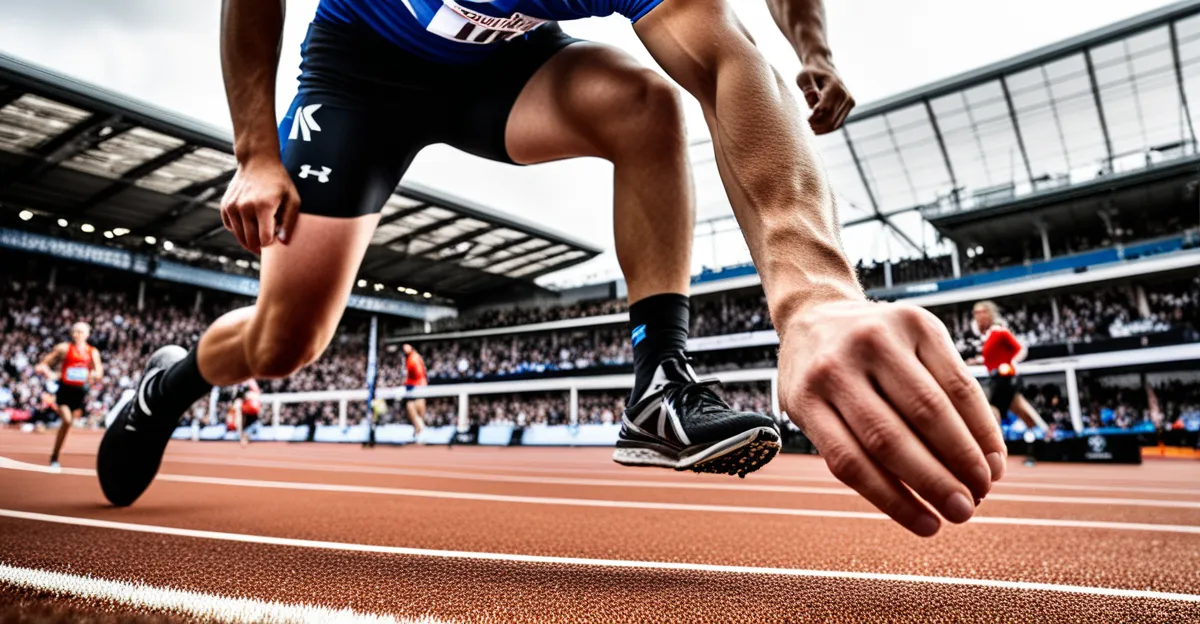Key Performance Enhancement Strategies Used by UK Athletes
UK athletes rely on a comprehensive set of performance strategies that form the core pillars of their athletic improvement. These pillars emphasize an integrated approach, where physical training, mental preparation, nutrition, and recovery methods combine seamlessly to optimize results. Such strategies are not isolated but interconnected, ensuring that each element supports the others to elevate performance consistently.
An essential aspect of performance enhancement among UK athletes is the commitment to evidence-based practices. Coaches and sports scientists base modifications and training programs on scientifically validated data rather than anecdotal advice. This data-driven approach allows precise adjustments tailored to an athlete’s needs, leading to measurable improvements and reducing the risk of injury.
Additional reading : Unleash your outdoor fun with briliantz gel blasters!
Moreover, UK athletes benefit from multidisciplinary teams that integrate physiologists, psychologists, nutritionists, and biomechanists to craft bespoke plans that address the unique demands of their sports. This holistic model has become a hallmark of elite UK performance, fostering resilience and maximizing the full potential of each competitor.
Advanced Training Routines in British Sports
British athletes engage in meticulously crafted training routines designed to optimize physical and technical capacities specific to their sports. The foundation of these routines is periodisation, which divides the training calendar into distinct phases—preparation, competition, and recovery. This systematic planning allows athletes to peak at the right moments, balancing workloads for maximal adaptation without overtraining.
Topic to read : What Are the Future Prospects for British Sports?
Elite British athletes benefit greatly from sport-specific exercise programmes developed by expert coaches within high-performance academies. These centres of excellence combine cutting-edge coaching methods with scientific support to tailor regimens that refine skill, enhance endurance, and build strength relevant to each discipline. For example, endurance runners focus on interval training and aerobic conditioning, while sprinters prioritize explosive power and speed drills within their programmes.
Adaptability is a hallmark of these training routines, as they evolve according to an athlete’s development stage. Youth athletes receive carefully moderated loads to safeguard growth and reduce injury risks, while professionals experience intensified and specialized training customized to competition demands. This progression ensures sustainable athletic growth, emphasizing gradual increases in intensity and complexity.
Overall, the integration of adaptive training frameworks and innovative coaching methods in British sports leads to progressive performance gains. Tailored periodisation and specialised exercise programmes offer a robust path for athletes to refine their potential methodically and strategically.
Nutrition and Diet Plans Tailored for UK Athletes
Nutrition plays a central role in the performance strategies of UK athletes, where diet plans are meticulously tailored to meet individual needs and athletic demands. Registered sports nutritionists collaborate closely with athletes and coaches to develop bespoke meal planning that optimizes energy availability, supports recovery, and enhances overall performance. These plans are dynamic, evolving in response to training phases, competition schedules, and specific physiological requirements.
Athlete nutrition within UK sports nutrition frameworks incorporates precise macronutrient distributions—carbohydrates, proteins, and fats—appropriately balanced for training intensity and sport type. For example, endurance athletes often require higher carbohydrate intake to sustain prolonged efforts, while power-based sportspersons focus on protein to aid muscle repair and growth. Ensuring adequate hydration and micronutrient intake is paramount, with nutritionists continuously monitoring to prevent deficiencies that could impair performance.
Supplement protocols are another critical component of UK athlete nutrition. These protocols prioritize safety, efficacy, and regulation, avoiding banned substances and unverified products. The guidelines emphasize using only supplements approved by UK regulatory bodies and under professional supervision. Supplements such as caffeine, creatine, and certain vitamins often support performance enhancement when used judiciously. However, each recommendation is data-driven, reflecting the strict evidence-based practices prevalent in UK sports science.
British Olympic teams exemplify the success of these tailored nutrition strategies. Detailed case studies demonstrate how personalized diet plans have contributed to medal-winning performances by improving recovery times and maintaining peak physiological condition. This systematic approach underlines the integration of nutrition into the broader performance enhancement ecosystem in UK athletics, showcasing the importance of controlled, scientific dietary interventions.
Sports Psychology Approaches Adopted by UK Competitors
UK athletes widely incorporate sophisticated psychological techniques to optimize their competitive edge. A core focus is cultivating mental resilience, which directly supports sustained high performance under pressure. Mental resilience training involves structured exercises that strengthen coping mechanisms against stressors such as competition anxiety and unexpected setbacks. This approach equips athletes to maintain composure and focus, reducing performance-impairing distractions.
One important question is: How do UK athletes effectively manage performance anxiety? The answer lies in tailored interventions including mindfulness practices, visualisation exercises, and strategic goal setting. Mindfulness enhances present-moment awareness, allowing athletes to control intrusive thoughts. Visualisation involves mentally rehearsing successful performance scenarios, which builds neural pathways conducive to desired actions. Systematic goal setting breaks down long-term ambitions into manageable targets, fostering motivation and confidence incrementally.
Furthermore, integration of sports psychology professionals within teams has become standard in the UK elite sports context. Psychologists collaborate closely with coaches and athletes, offering real-time support and adjusting techniques based on individual mental profiles. This multidisciplinary coordination ensures psychological preparation aligns with physical training and tactical objectives, reinforcing an athlete’s holistic readiness.
In summary, these psychological strategies form an indispensable pillar of performance enhancement for UK athletes, demonstrating how mental and emotional conditioning complements physical excellence. Through evidence-based methods and expert guidance, UK sports psychology fosters resilience, focus, and optimal mindset crucial for elite success.
Recovery Methods and Injury Prevention in the UK
Recovery methods and injury prevention are critical components of performance enhancement for UK athletes, integrating both traditional therapies and cutting-edge scientific approaches. Effective recovery protocols blend physiotherapy, massage, hydrotherapy, and sleep science to ensure athletes maintain peak condition and reduce injury risk.
Physiotherapy plays a central role by addressing musculoskeletal imbalances and facilitating rehabilitation following injuries. UK sports medicine experts design physiotherapy programmes tailored to individual athletes’ needs, focusing on restoring function and preventing re-injury. Complementary techniques such as massage therapy aid muscle relaxation and reduce tension, accelerating recovery. Hydrotherapy, using controlled water environments, supports low-impact rehabilitation and improves circulation, which is beneficial after intense training or competition.
Sleep science has emerged as a vital recovery tool, with scientists and coaches emphasizing optimal sleep duration and quality. Research demonstrates that proper sleep enhances muscle repair, cognitive function, and hormonal balance. UK athletes often receive guidance on sleep hygiene and utilize monitoring devices to track patterns and adjust rest strategies accordingly.
Injury prevention extends beyond recovery to proactive interventions. Data-driven recovery protocols leverage wearable sensors and biomechanical analysis to detect early signs of physical strain, enabling pre-emptive adjustments in training loads. This precision reduces overuse injuries and supports long-term athlete health.
The collaboration between NHS sports medicine specialists and private clinics further strengthens the recovery ecosystem. These partnerships ensure access to state-of-the-art diagnostic tools, expert rehabilitation, and continuous monitoring, forming a comprehensive safety net. This multidisciplinary integration underscores how UK sports prioritise evidence-based recovery methods and injury prevention alongside intense training, reinforcing athlete longevity and consistent performance.
Technology and Data Analytics in UK Sports Performance
UK athletes leverage sports technology and data analytics as integral components of their performance enhancement strategies. Cutting-edge tools like GPS trackers and wearable tech provide real-time data on athletes’ movement patterns, workload, and physiological markers. These devices enable coaches to monitor training intensity, track recovery, and adjust exercise programmes precisely to individual needs. This continuous feedback loop helps prevent overtraining and optimizes adaptation by informing daily decisions with quantifiable insights.
Video analysis and biomechanical feedback further enhance performance by dissecting technique with high precision. Coaches use slow-motion footage and 3D motion capture to identify inefficiencies in posture, stride, or stroke mechanics. Such detailed analysis supports targeted interventions that improve efficiency and reduce injury risk. AI-driven insights augment this process by analyzing vast datasets, detecting subtle performance trends that human observation might miss. For example, machine learning algorithms can predict fatigue onset or injury likelihood, allowing preemptive modifications.
Technology adoption in the UK spans from elite national teams down to grassroots programmes, ensuring a broad base of talent benefits from evidence-based, data-driven training. Software platforms integrate multiple data streams—physiological, biomechanical, tactical—offering holistic performance profiles that guide decision-making at every level. This systematic incorporation of sports technology and data analytics exemplifies the UK’s commitment to scientifically grounded, precise enhancements that elevate athletic performance.
Ethics, Regulations, and Unique UK Considerations
In UK sports, ethics in sports and strict adherence to regulations form a foundational aspect of performance enhancement. A central pillar is compliance with UK Anti-Doping (UKAD) policies, which enforce rigorous standards to prevent the use of banned substances. UK athletes and support teams undergo comprehensive education on these regulations to ensure that all performance enhancement measures align with legal and ethical frameworks.
How does UKAD operate in practice? UK Anti-Doping conducts systematic testing both in-competition and out-of-competition, employing advanced detection methods to maintain fairness. The organisation also investigates potential violations thoroughly, fostering a culture of transparency and accountability. This proactive stance deters doping and preserves the integrity of UK sports.
Beyond anti-doping rules, ethical considerations extend to the broader responsibility of safeguarding athlete welfare and promoting fair play. UK sports governing bodies embed these values in training environments, encouraging respect and honesty. Moreover, support systems are in place to assist athletes facing ethical dilemmas or pressures related to performance, ensuring guidance that prioritises health and long-term wellbeing.
Together, these measures underline a UK-specific commitment to balancing competitive ambition with integrity. The emphasis on regulations and athlete support highlights how ethical performance enhancement is carefully managed to protect the spirit of sport and the health of UK athletes.









